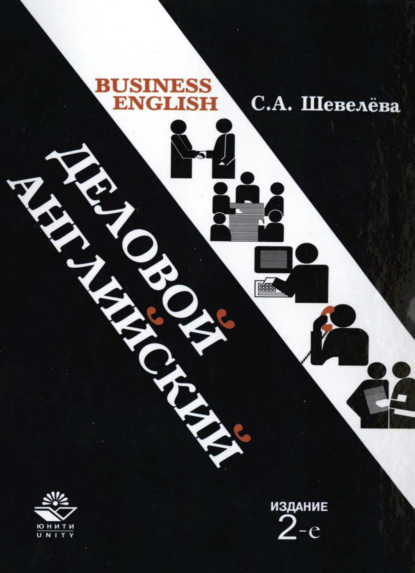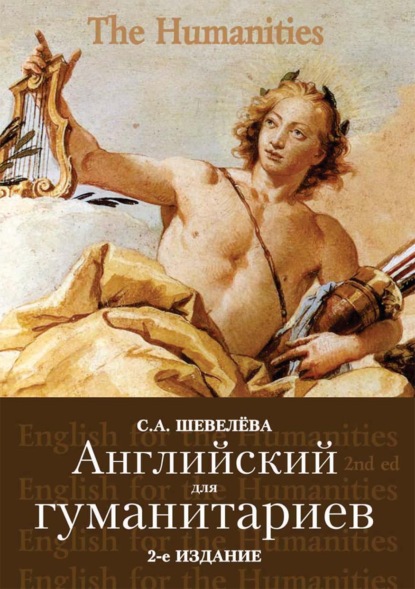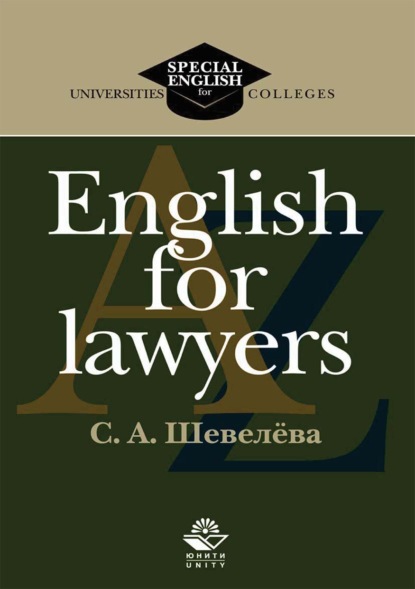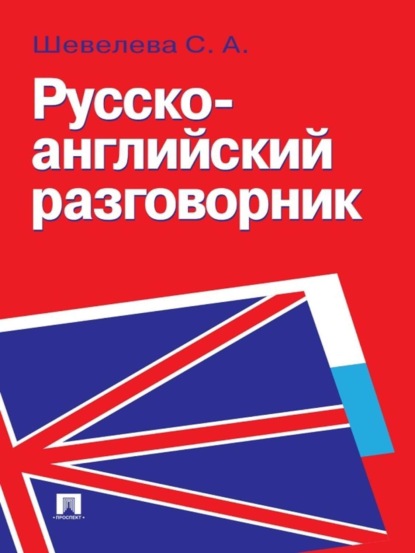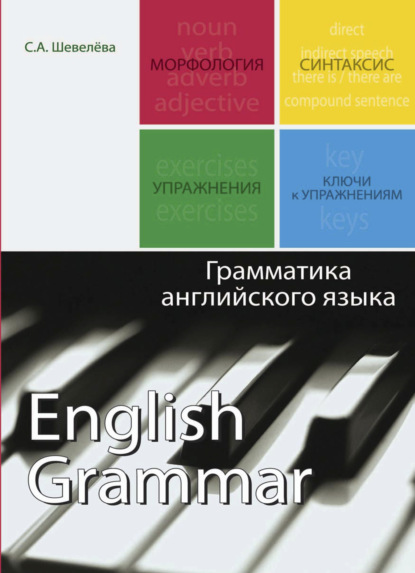
Полная версия:
Светлана Александровна Шевелева Английский язык. 101 типичная грамматическая ошибка
- + Увеличить шрифт
- - Уменьшить шрифт

С. А. Шевелева
Английский язык
101 типичная грамматическая ошибка
Учебное пособие

Английский язык
101 типичная грамматическая ошибка
От автора
В данное учебное пособие вошел материал, отобранный с учётом опыта преподавательской работы в высших и специализированных учебных заведениях в течение многих лет.
Пособие предназначено, в основном, для вашей самостоятельной работы, если вы поставили перед собой цель – сделать свою речь более правильной, без грамматических ошибок. Пособие может быть также использовано учащимися как дополнительный материал на занятиях с преподавателем.
Кроме того, пособие может использоваться преподавателями для составления тестов на различных стадиях учебного процесса в средних и высших учебных заведениях.
Пособие состоит из 101 раздела, основанного на определенных грамматических ошибках, которые часто делаются в устной или письменной речи. В начале раздела даются краткие пояснения на русском языке с примерами. Затем предлагается ряд упражнений. В конце пособия даются ключи к большинству упражнений.
При составлении пособия использовались различные современные источники, изданные в Англии, например:
• Practical English Usage (Michael Swan);
• A Practical English Grammar (A. J. Thomson, A. V. Martinet);
• Dictionary of Common Errors (N. D. Turton; J. B. Heaton);
• Living English Structure (W. S. Allen);
• Macmillan Collocations Dictionary.
В определённом смысле, пособие является продолжением пособия «100 типичных ошибок при изучении английского языка и как их исправить», вышедшего в этом же издательстве в 2012 г., в которое вошли типичные лексические и лексико-грамматические ошибки.
Хочется надеяться, что эти пособия помогут вам избегать ошибок, которые часто делаются русскоговорящими людьми при использовании английского языка в различных ситуациях повседневного и делового общения.
АРТИКЛИ
1. Континенты, страны, графства, штаты, земли и т. д
Обычно с такими существительными артикли не употребляются:
Europe, America, North America, Russia, England
Berkshire, Texas, Westphalia.
Но в следующих случаях употребляется определенный артикль:
1) если в название страны входят такие существительные как federation, kingdom, states, republic:
the Russian Federation, the United Kingdom of Great Britain and Northern Ireland, the United States of America, the People's Republic of China;
2) по традиции с названиями некоторых стран:
the Netherlands, the Argentine, the Philippines, the Cameroon, the Senegal, (the) Congo, (the) Lebanon;
3) в конструкциях существительное + of + название:
the continent of Asia, the state of Texas, the county of Kent.
1–1. Read and translate the sentences.
1. The official name of England is the United Kingdom of Great Britain and Northern Ireland.
2. It is often abbreviated to the United Kingdom.
3. The United Kingdom consists of four parts: England, Scotland, Wales and Northern Ireland.
4. The United States of America contains fifty states and the District of Columbia.
5. Every land has its own peculiar customs, and the United States is no exception.
6. The Philippines is officially known as the Republic of the Philippines.
7. The Argentine is also referred to as Argentina.
1–2. Use the Definite Article if necessary.
1) … France
2) … French Republic
3) … Italy
4) … Republic of Italy
5) … Spain
6) … Mexico
7) … United States of Mexico
8) … Liechtenstein
9) … Principality of Liechtenstein
10) … Germany
11) … Grand Duchy of Luxembourg
12) … Africa
13) … Australia
14) … continent of Australia
15) … South America
16) … state of Alabama
17) … Netherlands
18) … county of Suffolk
19) … Cameroon
20) … Senegal
1–3. Translate into English.
1) Шотландия
2) Уэльс
3) Великобритания
4) Северная Ирландия
5) Соединённое королевство
6) Соединённые штаты Америки
7) округ Колумбия
8) Аляска
9) штат Вермонт (Vermount)
10) штат Колорадо (Colorado)
2. Города, улицы, площади
Обычно с такими существительными артикли не употребляются:
London, Manchester, Moscow, St Petersburg, Paris, Madrid
Oxford Street, Broadway, Lexington Avenue, Willow Road, Trafalgar Square.
Но в отдельных случаях употребляется определенный артикль:
1) the Hague – Гаага.
the Strand – Стрэнд, одна из центральных улиц Лондона;
2) если в название улицы входит порядковое числительное:
the 47th Street, the Fifth Avenue.
Note: На вывесках, картах, в путеводителях и при указании адреса – названия городов, улиц и площадей даются без артиклей.
2–1. Read and translate the sentences.
1. The financial centre of London is called the City. It is spelt with the capital 'C'.
2. Washington is not a part of any state, it is located in the District of Columbia.
3. Washington, the capital of the USA, is usually referred to as 'Washington, D.C.'
4. The state of Washington is located in the Pacific Northwest region of the USA bordering on Canada.
5. New York City is a city in the state of New York the capital of which is Albany.
6. Broadway is one of the avenues of the borough of Manhattan, New York City.
7. The Hague is the only city the name of which is used with the definite article.
2–2. Translate into English.
1. Сити – это часть Лондона.
2. Улица Оксфорд находится в самом центре Лондона.
3. На улице Стрэнд находится несколько крупных театров.
4. Бродвей известен как мировой центр шоу-бизнеса.
5. Центром Бродвея считается площадь Таймс Сквер.
3. Имена, фамилии
Обычно с такими существительными артикли не употребляются:
Paul, John Brown, Mr Lewis, Mrs Lawson, Miss Marple.
Но в следующих случаях употребляется определённый артикль:
1) если с именем употребляются слова First, Second, Great:
Cathrine the Second (or Cathrine II), Peter the Great.
2) если перед фамилией употребляются слова junior младший, senior старший:
the junior Bush (or George Bush, Jr).
3) если фамилия употребляется во множественном числе для обозначения всей семьи: the Kennedies.
3–1. Use the Definite Article if necessary, and read the names.
1) Peter… First
2) Peter… I
3) Mary… II
4) Elizabeth… I
5) Charles… II
6) William… I (or William… Conqueror)
7) Edward… Elder
8) Alfred… Great
9) Edward… Confessor
10) George…VI
3–2. Translate into English.
1) Буш-старший
2) Александр Лазарев-старший
3) Анатолий Дуров-младший
4) супруги Кюри (Curie)
5) Строгановы
6) Смиты
4. Титулы, должности, звания, призвания
К данной группе относятся существительные:
queen, king, lord, lady и т. д.
president, prime minister, minister, chairman, director, manager и т. д.
general, admiral и т. д.
poet, writer и т. д.
1. Если после существительного указывается имя/фамилия, артикли не употребляются:
Queen Elizabeth, King Edward VIII, President Nixon.
2. Если имя/фамилия не указываются, обычно употребляется определённый артикль:
The President did not attend the Conference.
3. Если данные существительные употребляются в функции приложения или именной части сказуемого, то применяются следующие правила:
1) Если существительное указывает единичный пост или должность, артикли обычно не употребляются:
Paul Smith, President of the Organization, signed this petition.
He is President of the Union.
He was elected President in 2011.
2) Если существительное имеет значение один из, употребляется неопределённый артикль:
Nick Roberts, a manager at the Bank, confirmed the information.
She is a famous English detective story writer.
3) Если существительное имеет лимитирующее определение или речь идёт об очень известной личности, употребляется определённый артикль:
Mr Wilson is the professor who wrote this essay.
She married Richard Burton, the actor.
4–1. Read and translate the sentences.
1. Queen Elizabeth had dinner with President Obama later that evening.
2. President Barack Obama delivered a speech on that occasion.
3. Sir Winston Churchill served as Prime Minister twice, in 1940–1945 and 1951–1955.
4. Lady Diana, the Princess of Wales and the first wife of Charles, was killed in a car crash in 1997.
5. He didn't know Peter Rouse, (the) leader of the orchestra.
6. They appointed him Head Librarian last month.
7. I'd like you to meet Cathy Parker, the novelist.
4–2. Mark the right variant and translate the sentences.
1. In 2012, (the, – ) Queen Elizabeth II celebrated her Diamond Jubilee – 60 years on the throne.
2. Oscar Wilde, (a, – ) famous English essayist, poet, novelist and dramatist, died in Paris in 1900.
3. Alexander Pushkin, (the, – ) most famous Russian poet, was born in Moscow in 1799.
4. Horatio Nelson, (the, – ) English admiral who won the Battle of Trafalgar, is a national hero of Great Britain.
5. Then James Sweet (-, a) chairman of the Committee, took the floor.
6. She interviewed Saul Bellow, (an, the) economist who wrote this item.
7. Yesterday I got acquainted with Nelly (the, an) interpreter of Chinese.
4–3. Translate into English.
1. Он переводчик японского языка (Japanese).
2. Это переводчик японского языка, который работал на выставке.
3. Они вчера говорили с г-ном Вилли, председателем комитета.
4. Председатель комитета хорошо говорит по-русски.
5. Он был избран председателем в прошлом месяце.
5. Учебные заведения и другие учреждения
К данной группе относятся существительные school, university, college, hospital, church, prison, court и т. д.
Данные существительные употребляются без артикля в следующих случаях:
1) в различных устойчивых сочетаниях, например:
to enter school/university/college
to go to school/ university/college/hospital/church/prison/court
to be at school/university/college/church
to be in hospital/church/prison/court
2) если впереди стоит название города, например:
Oxford University, Trinity College, Moscow University.
Но в следующих случаях употребляется определённый артикль:
1) если название города стоит после существительного, например:
the University of London, the University of Moscow.
2) если перед существительным даётся имя учёного или определённое направление в науке, например:
the Humboldt University, the Lomonosov University, the Wurzburg school.
Note: Если эти существительные обозначают соответствующие здания, они употребляются с артиклями по общим правилам, например:
It is an old public school.
The school is located in the suburbs of the city.
5–1. Read and translate the sentences.
1. Eton College, one of the nine private public schools in England, has educated boys for nearly six centuries.
2. Jane is at/in hospital. She will be operated on tomorrow.
3. I left my coat in the hospital when I was visiting Jane.
4. The case went to court last month.
5. He was sent to prison for shoplifting.
6. Some workmen went to the church to repair the roof.
7. He usually sits at the side in the church.
5–2. Use the Definite Article if necessary, and translate the sentences.
1. How is Peter getting on at… school?
2. We went to… same school.
3. When did she finish… school?
4. He is graduating from… University next year.
5. I met her at… college when we were nineteen.
6. I'll meet him at… college at four.
7. I must drop in at… hospital to visit my grandmother.
8. She has been at… hospital for a month.
9… hospital is very old and needs a lot of improvements.
10. The Burtons go to… church every Sunday like many other families.
5–3. Translate into English.
1. Он сейчас лежит в больнице.
2. Больница находится в центре города.
3. Она каждый день ходит в школу.
4. Завтра её мама идет в школу на собрание.
5. Когда он заканчивает университет?
6. Существительные breakfast, lunch, dinner, supper
Обычно с такими существительными артикли не употребляются:
to have breakfast/lunch/dinner/supper
at breakfast/… before breakfast/… after breakfast/…
Но:
1) если существительное имеет описательное определение, употребляется неопределённый артикль:
We had a very nice lunch at a small restaurant.
2) если имеется или подразумевается лимитирующее определение, употребляется определённый артикль:
I didn't like the breakfast I cooked myself that morning.
6–1. Read and translate the sentences.
1. He said a cooked or continental breakfast could be enjoyed in the dining room.
2. Traditional or lighter breakfasts were not available.
3. They served a hearty breakfast early in the morning.
4. He quickly put on his school uniform, skipped breakfast and went off to school.
5. After an excellent lunch, some of the tourists went to look round the museum.
6. We returned home for a late lunch.
7. The boss always went out to lunch.
6–2. Use the Indefinite Article if necessary, and translate the sentences.
1. We had… lunch at midday.
2. We'll have… quick lunch then get back to work.
3. They stopped at a pub and enjoyed… hearty lunch.
4. She joined the rest of the family for… celebratory lunch.
5. The meeting finished with… informal lunch.
6. I had a friendly talk with Jim before… lunch.
7. What are you going to do after… lunch?
6–3. Translate into English.
1. Они сейчас завтракают.
2. Он быстро позавтракал и отправился на работу.
3. Где он обычно обедает?
4. Он звонил мне до обеда.
5. Это был дружеский обед.
7. Существительные, обозначающие болезни и недомогания
Обычно такие существительные употребляются без артикля:
flu, appendicitis, measles корь, toothache, earache, backache, stomachache.
Но:
1) с некоторыми существительными употребляется неопределенный артикль: a cold, a sore throat, a headache.
2) существительное flu иногда употребляется с определённым артиклем.
7–1. Read and translate the sentences.
1. I have got toothache again.
2. Have you had appendicitis?
3. I have got a headache.
4. I've got a terrible cold.
5. She has never had measles.
6. If you have already had measles, you can't get it again.
7. I think I've got (the) flu.
8. If you do catch flu, stay home.
9. At first I thought I had the flu.
10. There is a lot of flu around at the moment.
7–2. Translate into English.
1. У неё болит зуб.
2. Когда он болел гриппом последний раз?
3. Что вы посоветуете принять, если у меня болит голова?
4. Она не болела в детстве корью.
5. У него часто бывает ангина.
8. Конструкция «существительное + числительное»
Перед существительным, за которым следует числительное, обозначающее номер, артикль не употребляется.
8–1. Read and translate the word-combinations.
Lesson Three
Unit Five
Part Four
Room Ten
page 9
Gate 8
Sector 2
Platform 10
flight CF34
size 18
Office 7
Contract 45
Agreement 76-B
Licence Agreement 9D
Clause 3
8–2. Translate into English.
1) страница 22
2) Контракт 87/3
3) Статья 5 (контракта)
4) Офис 6
5) Комната 3
6) Выход 8 (к самолёту)
7) рейс BA34
8) Упражнение 20
9) Раздел 2
10) Часть 4
9. A number of – the number of
Данные словосочетания различаются по смыслу:
a number of... большое количество, много…
the number of... количество, число; номер…
9–1. Read and translate the sentences.
1. The number of unemployed is rising steadily.
2. He spoke about the unprecedented number of applications received.
3. This page indicates the total number of visitors to the site.
4. The actual number of women who have experienced domestic violence is bigger.
5. Their residence had the right number of rooms.
6. Please, note that there are only a limited number of seats.
7. What is the number of her room?
9–2. Use the right Article and translate the sentences.
1. The airline wants to increase… number of flights to this resort.
2. Their aim was to reduce… number of cars on the road.
3…. number of books is missing from the library.
4. The figure in brackets gives… number of students in the class.
5. This survey estimated… number of elephants in Mozambique.
6… number of people have tried to find this treasure.
7. This is a sport enjoyed by… huge number of young people.
9–3. Translate into English.
1. Большое количество молодых людей любит этот спорт.
2. Количество любителей этого вида спорта растёт.
3. Укажите здесь количество студентов в вашей группе.
4. Они не сообщали о количестве пассажиров.
5. Здесь вы можете найти большое количество словарей.
10. At present – at the present time
Эти словосочетания равноценны по смыслу и переводятся как в настоящее время.
10-1. Use the Definite Article if necessary, and translate the sentences.
1. We don't need any more water at… present.
2. A few exhibitions are being held in the city at… present time.
3. At… present they are arranging the talks to be held in May.
4. He is shooting another war film at… present time.
5. What research is he making at… present?
6. At… present they are working at another project.
7. A film festival is being held in this city at… present time.
8. He needs some help at… present.
9. At… present time he is studying Spanish.
10. She does not want to go abroad at… present.
11. Per hour – an hour
Эти сочетания практически равноценны по смыслу и переводятся как за/в час. Слово per, заимствованное из латинского языка, более официально.
Помимо hour в таких сочетаниях употребляются существительные day, week, month, year, kilometre, mile и др.
11-1. Use the Indefinite Article if necessary, and translate the sentences.
1. He made thirty miles… hour (30 mph).
2. We are doing 70 miles… hour.
3. It costs sixty pence per… kilo.
4. The accommodation costs 100 pounds… week.
5. He earned 30 dollars per… day.
6. He paid a fee of 100 pounds per… annum (for each year).
7. He didn't know that private lessons cost 30 dollars per… hour.
8. Private lessons cost £ 20… hour.
9. We did 200 miles… day.
10. The flour costs $4 per… kilo.
ПРЕДЛОГИ
12. To – for – in
Хотя все три предлога переводятся как в, они употребляются по-разному.
Предлог to употребляется с существительным после глаголов движения to go, to come:
He is going to Kiev next month.
Он едет в Киев в следующем месяце.
Предлог for употребляется с существительным после глагола движения to leave:
He is leaving for Kiev next month.
Он уезжает в Киев в следующем месяце.
Предлог in употребляется с существительным после статических глаголов to be, to stay, to live и др.:
He is in Kiev now. Сейчас он в Киеве.
Note:
1. После глагола to be в Present Perfect с существительным употребляется предлог to:
Have you ever been to England?
Вы когда-нибудь были в Англии?
2. После глагола движения to enter существительное употребляется без предлога:
He entered the room and stopped.
Он вошёл в комнату и остановился.
12-1. Read and translate the sentences.
1. Let's go to some place where it's quiet.
2. They went to the cinema to see this new film.
3. This road goes to the beach.
4. Are you coming to my party?
5. They came to a river and decided to camp out on the bank.
6. He left London for Moscow very early.
7. When is he leaving for Italy?
8. Have you ever been to France?
9. He isn't well and will stay in bed for a day or so.
10. When he entered the room he saw it was empty.
12-2. Use the preposition (for or to)if necessary, and translate the sentences.
1. He has gone… China.
2. Have you ever been… Japan?
3. I have never been… any African country.
4. We went… the theatre a few days ago.
5. When she came… the party she saw many people she knew.



